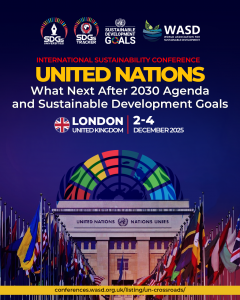Armed Conflict and University Students: Sudanese Students’ Struggle and Potential for National Development, Dr Chiemi Kurokawa
Dr Chiemi Kurokawa
Sophia University
Japan
Purpose: This study examines the issues prevent youth from considering and pursuing their plans to contribute to their home country’s development during the armed conflict, focusing on Sudanese university students who fled to Cairo following the outbreak of armed conflict in April 2023.
Methodology: The study draws on Joan Tronto’s ethics of care, which comprises four sequential phases leading to a fifth phase—caring with. It analyzes students’ narratives through this lens, positioning Islamic mutual aid (takaful) as a culturally grounded expression of this final phase of collective responsibility. Data were collected through semi-structured interviews with 12 Sudanese students in medicine, engineering, and the social sciences, conducted during two fieldwork periods (September 2023 and December 2024–January 2025) in Cairo. Interviews were audio-recorded, transcribed, and analyzed using the qualitative data analysis software MAXQDA.
Findings: The students, having lived through the revolution in 2019 and the outbreak of armed conflict in 2023, expressed a sense of moral responsibility and a strong desire to take action in response to their country’s destruction. However, their aspirations were hindered by four interrelated factors: (1) difficulties in envisioning future educational or career paths due to the absence of institutional care, (2) psychological distress caused by the ongoing devastation in Sudan, (3) distrust in peace, fear of recurring violence and rejection of warring actors, and (4) decline of student engagement due to the loss of physical community. While maintaining access to learning opportunities is essential to fostering future brain gain by allowing students to develop knowledge and skills, the role of higher education institutions should be reconsidered in terms of providing both institutional care (1) and care for students grappling with emotional and political uncertainty (2-4).
Originality/Value: This study offers a fresh perspective on brain gain debates by highlighting its potential during ongoing armed conflict, whereas existing literature has mainly focused on the post-conflict period. As prior research has emphasized the importance of highly skilled individuals in national reconstruction, the findings shed new light on how higher education institutions can play a proactive role amid conflict to support students.
Keywords: Sudan, Higher Education, Conflict, Ethics of Care, Brain Bain.

